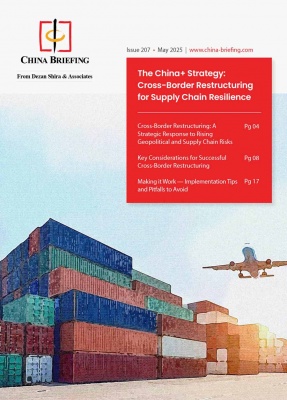China Further Expands the 240-Hour Visa-Free Transit Policy to 55 Countries
China has expanded the 144-hour visa-free transit policy, which now allows people from 55 countries to enjoy 10 days of travel to select areas of the country without applying for a visa beforehand. Amid China’s continuous efforts to promote people-to-people exchange, we explain who is eligible for China’s visa-free transit and where in China you can travel on this special entry permit.
UPDATE (June 12, 2025): The National Immigration Administration (NIA) of China has announced that nationals of Indonesia shall be eligible for China’s 240-hour visa-free transit policy starting June 12, 2025. This expands the list of eligible countries to 55.
UPDATE (December 17, 2024): The National Immigration Administration (NIA) of China has announced a major expansion and optimization of its visa-free transit policy, effective December 17, 2024. Under the upgraded policy, eligible foreign travelers transiting through China can now stay for up to 240 hours (10 days), a significant extension from the previous 72-hour and 144-hour visa-free transit policy. In addition, 21 new ports have been added, increasing the total number of visa-free entry/exit points to 60 across 24 provinces. Read more here.
UPDATE (July 31, 2024): According to the General Administration of Customs Announcement [2024] No. 96, the railway ports for the four cross-border conventional trains (Intercity Through Trains) between mainland China and Hong Kong at Beijing West Station, Shanghai Station, Guangzhou, and Dongguan have been closed since July 31, 2024. The closure of these railway ports does not affect the operation of high-speed passenger trains between the mainland and Hong Kong. The content of this article has been amended accordingly.
The National Immigration Administration (NIA) of China has continuously expanded the country’s visa-free transit policy. Under the upgraded policy, eligible foreign travelers from 55 countries transiting through China can now stay for up to 240 hours (10 days), a significant extension from the previous 72-hour and 144-hour visa-free transit policy. In addition, 21 new ports have been added, increasing the total number of visa-free entry/exit points to 60 across 24 provinces.
It is important to note that, in order to be eligible for visa-free transit, you must be going on to a third country after leaving China. Entering China under the visa-free transit policy when not continuing travel to a third country will be considered illegal entry to the country.
This article explains how China’s visa-free transit policy works and summarizes some frequently asked questions.
What is China’s visa-free transit policy?
Visa-free transit is one of China’s visa exemption policies that are provided to eligible foreigners coming from selected countries.
Under the visa-free transit policy, foreign travelers can enjoy a 10-day stay (240-hour stay) in certain Chinese cities without a visa, provided they come from 54 eligible countries, enter and exit China from eligible ports, stay within the allowed cities and regions, as well as satisfy other requirements. The extended stay duration from 72 hours/144 hours to 10 days is one of the most substantial upgrades in recent years.
Which countries’ citizens are eligible for China’s visa-free transit policy?
To obtain this visa exemption, the foreign national must have a valid passport from one of the 55 countries, which are:
- 25 countries in the Europe Schengen area: Austria, Belgium, Czech Republic, Denmark, Estonia, Finland, France, Germany, Greece, Hungary, Iceland, Italy, Latvia, Lithuania, Luxembourg, Malta, Netherlands, Norway, Poland, Portugal, Slovakia, Slovenia, Spain, Sweden, and Switzerland.
- 15 other countries in Europe: Russia, United Kingdom, Ireland, Cyprus, Bulgaria, Romania, Ukraine, Serbia, Croatia, Bosnia and Herzegovina, Montenegro, Macedonia, Albania, Monaco, and Belarus.
- Six countries in the Americas: the United States, Canada, Brazil, Mexico, Argentina, and Chile.
- Two countries in Oceania: Australia and New Zealand.
- Seven countries in Asia: Republic of Korea, Japan, Singapore, Brunei, the United Arab Emirates, Qatar, and Indonesia.
What are the requirements for China’s visa-free transit policy?
As per the requirements of China’s National Immigration Authority (NIA), people applying for the 240-hour visa-free transit must have:
- A valid passport or another international travel document that is valid for more than three months from the arrival date;
- An interline ticket (connecting ticket) with the confirmed departure date and seat number leaving for a third country or region within 144 hours; and
- The landing card for foreigners in transit that is filled out upon arrival in China.
You may also be required to answer some questions at immigration control upon arrival.
It’s also important to double-check with the airline company about their boarding policy. In principle, eligible passengers can present valid entry and exit documents and a confirmed interline ticket (connecting ticket) with the confirmed departure date and seat number for a third country or region within 240 hours to the staff of the transportation vehicle at check-in. However, there have been cases where airline companies declined boarding, possibly because they are not familiar with such policies.
Which cities can you travel to during the visa-free transit?
Despite the name, China’s visa-free transit policy does not mean you can travel to any city in the country. First introduced to three cities in East China’s Shanghai-Jiangsu-Zhejiang area in 2016, the country’s visa-free transit policy has expanded multiple times.
More eligible countries
- Effective June 12, 2025, Indonesia was added to the eligible country list, bringing the total number to 55.
- Effective November 17, 2023, Nowary was added to the eligible country list, bringing the total number to 54.
Expanded entry and exit ports
On December 17, 2024, an additional 21 ports were added to China’s visa-free transit program, covering major international airports in regions such as Shanxi, Jiangsu, Zhejiang, Fujian, Anhui, Jiangxi, Shandong, Hunan, Guangxi, Hainan, Sichuan, and Guizhou.
Key newly added ports include:
- Shanxi: Taiyuan Wusu International Airport
- Jiangsu: Wuxi Sunan Shuofang Airport, Yangzhou Taizhou Airport
- Zhejiang: Wenzhou Longwan Airport, Yiwu International Airport
- Fujian: Fuzhou Changle Airport, Quanzhou Jinjiang, Wuyishan Airport
- Hainan: Haikou Meilan Airport, Sanya Phoenix International Airport
- Sichuan: Chengdu Tianfu International Airport
With these additions, the total number of eligible ports has expanded from 39 to 60.
Broader eligible regions
Foreign travelers under this program can now access 24 provinces across China, up from 19 previously. The newly added regions include Shanxi, Anhui, Jiangxi, Hainan, and Guizhou.
- In Anhui, Hainan, and Guizhou, travelers can explore the entire province.
- In Shanxi, the permitted areas are limited to Taiyuan and Datong.
- In Jiangxi, travelers can visit Nanchang and Jingdezhen.
- The stay area in other regions like Fujian, Hubei, and Shaanxi has now expanded to cover the entire province.
- Guangxi has extended access to 12 cities, including Nanning, Guilin, Beihai, and Liuzhou.
Notably, under this policy, visa-free travelers can cross provincial boundaries within the 24 eligible regions, offering greater flexibility for regional travel.
The eligible cities, corresponding entry ports, and scope of permitted travel areas are listed in the table below.
| Scope of China’s 240-Hour Visa-Free Transit Policy | |||
|---|---|---|---|
| No. | Province (Region, City) | Applicable port | Area of stay |
| 1 | Beijing | Beijing Capital International Airport | Beijing |
| 2 | Beijing Daxing International Airport | ||
| 3 | Tianjin | Tianjin Binhai International Airport | Tianjin |
| 4 | Tianjin Seaport (Passenger) | ||
| 5 | Hebei | Shijiazhuang Zhengding International Airport | Hebei Province |
| Qinhuangdao Seaport (Passenger) | |||
| 7 | Liaoning | Shenyang Taoxian International Airport | Liaoning Province |
| 8 | Dalian Zhoushuizi International Airport | ||
| 9 | Dalian Seaport (Passenger) | ||
| 10 | Shanghai | Shanghai Hongqiao International Airport | Shanghai |
| 11 | Shanghai Pudong International Airport | ||
| 12 | Shanghai Seaport (Passenger) | ||
| 13 | Jiangsu | Nanjing Lukou International Airport | Jiangsu Province |
| 14 | Sunan Shuofang International Airport | ||
| 15 | Yangzhou Taizhou International Airport | ||
| 16 | Lianyungang Seaport (Passenger) | ||
| 17 | Zhejiang | Hangzhou Xiaoshan International Airport | Zhejiang Province |
| 18 | Ningbo Lishe International Airport | ||
| 19 | Wenzhou Longwan International Airport | ||
| 20 | Yiwu International Airport | ||
| 21 | Wenzhou Seaport (Passenger) | ||
| 22 | Zhoushan Seaport (Passenger) | ||
| 23 | Anhui | Hefei Xinqiao International Airport | Anhui Province |
| 24 | Huangshan Tunxi International Airport | ||
| 25 | Fujian | Fuzhou Changle International Airport | Fujian Province |
| 26 | Xiamen Gaoqi International Airport | ||
| 27 | Quanzhou Jinjiang International Airport | ||
| 28 | Wuyishan International Airport | ||
| 29 | Xiamen Seaport (Passenger) | ||
| 30 | Shandong | Jinan Yaoqiang International Airport | Shandong Province |
| 31 | Qingdao Jiaodong International Airport | ||
| 32 | Yantai Penglai International Airport | ||
| 33 | Weihai Dashuibo International Airport | ||
| 34 | Qingdao Seaport (Passenger) | ||
| 35 | Henan | Zhengzhou Xinzheng International Airport | Henan Province |
| 36 | Hubei | Wuhan Tianhe International Airport | Hubei Province |
| 37 | Hunan | Changsha Huanghua International Airport | Hunan Province |
| 38 | Zhangjiajie Hehua International Airport | ||
| 39 | Guangdong | Guangzhou Baiyun International Airport | Guangdong Province (can exit through any of Guang Dong’s international airport |
| 40 | Shenzhen Bao’an International Airport | ||
| 41 | Jieyang Chaoshan International Airport | ||
| 42 | Nansha Seaport (Passenger) | ||
| 43 | Shekou Seaport (Passenger) | ||
| 44 | Hainan | Haikou Meilan International Airport | Hainan Province |
| 45 | Sanya Phoenix International Airport | ||
| 46 | Chongqing | Chongqing Jiangbei International Airport | Chongqing City |
| 47 | Guizhou | Guiyang Longdongbao International Airport | Guizhou Province |
| 48 | Shaanxi | Xi’an Xianyang International Airport | Shaanxi Province |
| 49 | Shanxi | Taiyuan Wusu International Airport | Taiyuan, Datong |
| 50 | Heilongjiang | Harbin Taiping International Airport | Harbin |
| 51 | Jiangxi | Nanchang Changbei International Airport | Nanchang, Jingdezhen |
| 52 | Guangxi | Nanning Wuxu International Airport | 12 cities: Nanning, Liuzhou, Guilin, Wuzhou, Beihai, Fangchenggang, Qinzhou, Guigang, Yulin, Hezhou, Hechi, and Laibin |
| 53 | Guilin Liangjiang International Airport | ||
| 54 | Beihai Fucheng Airport | ||
| 55 | Beihai Seaport (Passenger) | ||
| 56 | Sichuan | Chengdu Shuangliu International Airport | 11 cities: Chengdu, Zigong, Luzhou, Suining, Leshan, Deyang, Neijiang, Yibin, Ya’an, Meishan, and Ziyang. |
| 57 | Chengdu Tianfu International Airport | ||
| 58 | Yunnan | Kunming Changshui International Airport | 9 cities: Kunming, Chuxiong, Yuxi, Honghe, Wenshan, Pu’er, Xishuangbanna, Dali, and Lijiang. |
| 59 | Lijiang Sanyi International Airport | ||
| 60 | Mohan Railway Port | ||
*Bolded are newly added ports, provinces, or areas of stay.
It is therefore important to pay attention to the permitted arrival airports, railway stations, or cruise ports when planning your trip, and to make sure that your itinerary during your stay in China is within the permitted areas, to ensure you do not inadvertently cross into an area where you are not permitted or exit the country illegally.
Under what circumstances can the visa-free transit be denied?
The immigration officers at the border may refuse to issue you a temporary entry permit in any of the following circumstances:
- If you are not allowed to enter China under Chinese laws or administrative regulations;
- If your passport or other international travel document is expiring in less than three months, or contains a previous stamp of rejection by a Chinese visa-issuing agency;
- If you have previously illegally entered or exited China, illegally resided in China, or illegally worked in China in the last five years;
- If you have a record of violating accommodation registration regulations in the last two years, and the circumstances were considered “severe”; and
- If you are not going to a third country after leaving China (as the visa-free transit policy applies only to travelers bound for a third country and therefore transiting through China).
China’s visa-free policy is not applicable to crew members of international aircraft or ships or their accompanying family members.
Things to note before your 240-hour visa-free stay in China
You are required to abide by all Chinese laws and regulations during your stay, and you cannot leave the permitted scope of travel or exceed the permitted duration of the transit.
If you stay in a hotel during your visit, the hotel will register your stay with the local police station using your passport or another international travel document (you will not be required to go to the police station in person, the hotel will only require to take a copy of your passport when you check in). Note that due to this requirement, not all hotels are able to host foreign guests. It is therefore best to check with the hotel in advance to ensure that they can accept foreign guests. (Read more here: Temporary Residence Registration in China – A Guide for Foreign Residents and Visitors)
If you stay in another place, such as at a friend or family member’s home, you and your host must go and register at the local public security bureau (usually a police station, but it could also be a service station for foreigners) within 24 hours of your arrival. You will need to bring your passport, as well as your host’s housing contract (proof of address) and identification card. Online channels exist in some cities such as Shanghai. In practice, many foreign travelers may simply skip this step as it can be cumbersome, but this could lead to unexpected problems in some cases, such as when the foreign traveler has to deal with police officers during some formal procedures.
In the event of an unexpected incident where you need to stay beyond 240 hours, you must apply to the immigration department at the local public security bureau for a corresponding stay permit.
You will be liable for punishment by the immigration authorities or border forces if you leave the permitted area, overstay the entry permit duration, or fail to register your accommodation in accordance with the law
China’s 240-hour visa-free transit policy is an excellent option for short stopovers in China when traveling to a third country. With the many different ports available, you can now explore multiple areas of the country by choosing an entry port that covers the places you want to go to without having to apply for a tourist visa.
FAQs
Q1: How is the 240-hour visa-free transit period calculated?
A: After the border inspection authority issues a temporary entry permit to the traveler, the 240-hour visa-free stay period starts from 00:00 the next day after entry. The traveler can stay in the designated administrative areas for 240 hours without a visa.
Q2: How can foreigners who meet the conditions apply for the 240-hour visa-free transit policy?
A: Eligible travelers can show their valid entry and exit documents and a connecting ticket with a confirmed date and seat to a third country (or region) within 240 hours to the staff of the transportation vehicle at check-in. The person in charge of the transportation vehicle will report to the border inspection before arriving at the port. After verification, the border inspection will handle the 144-hour visa-free transit procedures.
Q3: If I haven’t bought a ticket for departure when entering China and plan to buy a ticket to a third country within 240 hours after entry, can I apply for the 240-hour visa-free transit?
A: No. According to the regulations, foreigners who meet the conditions for the 240-hour visa-free transit must hold a connecting ticket with a confirmed date and seat. This means you must have already purchased the departure ticket before entering China.
Q4: If I come to a city in China that implements the 240-hour visa-free transit policy from a certain country (or region) and have a confirmed return ticket to my country (or region) within 240 hours, can I apply for this policy?
A: No. According to the regulations, the 240-hour visa-free transit policy is for foreigners transiting to a third country or region. Therefore, the departure and destination countries must be different.
Q5: What should foreigners applying for the 240-hour visa-free transit policy pay attention to?
A: The border inspection authority will not issue a temporary entry permit to individuals whose passports or other international travel documents are valid for less than three months, have a visa refusal stamp from Chinese visa authorities, or have records of illegal entry, illegal residence, or illegal employment within the past five years.
During the visa-free transit stay, foreigners must comply with Chinese laws and regulations, not exceed the permitted stay area or duration. If staying in a hotel, the hotel will handle the accommodation registration. If staying in other residences, the individual or host must register with the local police station or foreigner service station within 24 hours of arrival.
Foreigners who exceed the permitted stay area or duration, exit from non-designated transit ports, or fail to register accommodation as required will be punished by the border inspection authority or local public security authority according to the law.
Q6: What should foreigners do if they cannot leave within 240 hours due to special reasons after entering China with the 240-hour visa-free transit?
A: In case of force majeure or other reasons requiring a stay beyond 240 hours in the visa-free area, they should apply for the corresponding stay permit from the public security authority’s exit and entry administration department as per regulations.
(Adapted from information posted on the NIA official website)
Also Read:
A Complete Guide to China’s Visa-Free Policies
About Us
China Briefing is one of five regional Asia Briefing publications, supported by Dezan Shira & Associates. For a complimentary subscription to China Briefing’s content products, please click here.
Dezan Shira & Associates assists foreign investors into China and has done so since 1992 through offices in Beijing, Tianjin, Dalian, Qingdao, Shanghai, Hangzhou, Ningbo, Suzhou, Guangzhou, Haikou, Zhongshan, Shenzhen, and Hong Kong. We also have offices in Vietnam, Indonesia, Singapore, United States, Germany, Italy, India, and Dubai (UAE) and partner firms assisting foreign investors in The Philippines, Malaysia, Thailand, Bangladesh, and Australia. For assistance in China, please contact the firm at china@dezshira.com or visit our website at www.dezshira.com.
- Previous Article China’s AI Healthcare Market (Part I): Growth Trends, Drivers, and APAC Comparison
- Next Article
























